Negotiating Peace: Concerns Rise in Armenia Over Potential Costs of Azerbaijan Agreement

Yerevan, Armenia – A palpable sense of unease permeates the atmosphere in Yerevan, despite ongoing negotiations aimed at securing a lasting peace with Azerbaijan. While the prospect of ending decades of conflict is undeniably appealing, many Armenians harbor deep concerns about the potential cost of such an agreement. The echoes of children’s laughter and the quiet murmurings of elders in the city's central square are juxtaposed with a growing anxiety about the future.
The crux of the apprehension lies in the perceived concessions that might be required to achieve a comprehensive peace. For decades, the conflict over Nagorno-Karabakh and surrounding territories has defined Armenia's national identity and security concerns. The recent shift in the geopolitical landscape, marked by Azerbaijan's military advances and the evolving dynamics within the region, has placed immense pressure on Armenia to consider significant compromises.
One particularly sensitive issue is the future of territories currently under Armenian control, which Azerbaijan claims as its own. The prospect of relinquishing these lands, especially those with historical and cultural significance, is deeply unsettling for many Armenians. Residents of villages like Kapan, located near the border with Azerbaijan and now facing Azerbaijani military outposts just a few hundred meters away, are acutely aware of the potential implications. Their lives are directly intertwined with the outcome of these negotiations.
“We’ve lived here for generations,” says one resident of Kapan, expressing a sentiment shared by many in the region. “We built our homes, raised our families, and worked the land. To simply hand it over… it’s difficult to comprehend.” The fear isn't just about losing land; it's about the potential disruption to livelihoods, the displacement of communities, and the erosion of national pride.
Beyond territorial concerns, there's a broader anxiety about the long-term security implications of a peace agreement. Some worry that concessions could leave Armenia vulnerable to future aggression or influence from Azerbaijan. The need for robust security guarantees and mechanisms to prevent renewed conflict is paramount, but whether these can be adequately secured remains an open question.
The Armenian government, led by Prime Minister Nikol Pashinyan, has emphasized the importance of pursuing peace as a means of ensuring Armenia's stability and prosperity. However, the government faces a delicate balancing act – navigating the demands of the international community, addressing the concerns of its own citizens, and safeguarding Armenia's national interests. Public opinion is divided, with some supporting the pursuit of peace at any cost, while others advocate for a more cautious approach, prioritizing the protection of Armenian sovereignty and territorial integrity.
The negotiations are complex and fraught with challenges. Building trust between the two nations, addressing historical grievances, and establishing a framework for peaceful coexistence will require sustained effort and a willingness to compromise on both sides. The international community, including Russia, the United States, and the European Union, plays a crucial role in facilitating the process and providing support for long-term stability.
Ultimately, the success of these negotiations hinges on whether Armenians can be convinced that the price of peace is not too high. It requires a transparent and inclusive dialogue, addressing the legitimate concerns of the population and ensuring that any agreement reflects the fundamental interests of Armenia and its people. The future of Armenia hangs in the balance, dependent on the delicate dance of diplomacy and the enduring hope for a lasting peace.






